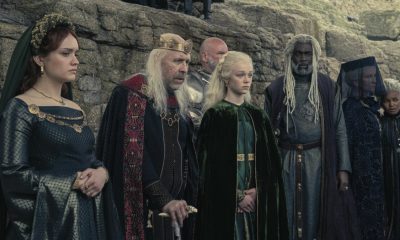Entertainment
‘Atlanta’ Season 4 offers an unflinching look at family. Here’s why that’s important.

In “Alligator Man”, the opening act of Atlanta Season 2, viewers were given a glimpse into the shared family life of Earn (Donald Glover) and Alfred (Brian Tyree Henry). In the episode, Earn pays a visit to his uncle and Al’s father Willy (Katt Williams, whose performance in the episode won him an Emmy). At the time, Earn is on probation and doing Al a favor, but Willy’s girlfriend Yvonne complains to the police. Willy and Earn get into a confrontation during which Earn is accused of fearing Al (“Mr. Moneybags”) and of intentionally staying on his good side: “You find out,” Willy says, “family is business”.
Atlanta is prone to offering slices of life, adding slivers of context, and layering the stories of its core characters, whose lives sometimes feel like pieces of a collage left for the audience to put together. “Alligator Man” and “FUBU”, episodes in the show’s Robbin’ Season, were the last in which figures like Al’s father and Earn’s mother Gloria (Myra Lucretia Taylor) made an appearance.
Two seasons later, in Season 4, the show spotlights family more fiercely, intertwining themes of time and history. Episode 4 “Light Skinned-ed” places family under the microscope with intentionality, sketching an unflinching portrait on individual, community and universal levels. The episode’s description makes this intention clear: “My family is so crazy we need our own reality TV show. How you still got beef from the ’70s? Whew.”
Written by Stefani Robinson and directed by Hiro Murai, the episode brings Earn’s parents, aunts, and uncles into focus. Earn and Al, meanwhile, oscillate between bystanders and facilitators, as the generation above them grapples with circumstances of the past that seep into the present. The central tension lies between Gloria and her sister Jeanie (Michole Briana White), when the latter accuses Gloria of “stealing” their father — Gloria drives off with her father in the car as she drops Earn and Jeanie off at church. What follows is a tense sibling phone call (Williams makes a hilarious cameo returning as Uncle Willy); a police encounter when Jeanie accuses Gloria of kidnapping; and a final family meal.
Of course, 27 minutes is hardly enough time for decades-old family conflict to be resolved. But the confrontations are carefully and wondrously sketched out by Robinson and Murai, in a way that viewers and several critics relished.

Donald Glover and Michole Briana White in “Light Skinned-ed”.
Credit: FX
Family has long been memorialized in literature and art, with countless artists producing entire bodies of work to decipher the complexities beneath it. Tolstoy infamously wrote of the unhappy family in Anna Karenina; family-centric sitcoms have been a staple in America since the 1950s. With all forms and shapes of art, the mysteries and contours of family can be explored. We feel intrigue at other family dynamics, foster similarities with some, find hope in others. We find refuge and have room for reflection. The shared experience of family and the lived experiences of one is something that people do not seem tire of seeing.
And for families of color, seeing an uptick in representation on-screen and in writing is arguably all the more significant. Family sitcoms have often and historically examined white, two-parent, heteronormative households, rendering such families the norm while also leaving those outside this realm feeling alienated.
The narrative and emotional arc in this Atlanta episode can, and should, serve as a blueprint for portrayals of family and all the baggage that comes with being part of one. What was so wonderful about “Light Skinned-ed” was its insight into the Marks family’s specific points of tension, but also the very concept of family itself. There is little resolution in this episode, which plays out like a tragicomedy of sorts.
Earn has a key revelation in the episode. “I just don’t wanna end up like them,” Earn tells his cousin, after the two watch the four siblings have a biting conversation from four locations over the phone. They are each isolated on screen, in their respective environments, sharing snippets of their childhoods and the ties that broke yet bind them. Earn expressed similar fears to Willy in “Alligator Man” about not wanting to grow to become a similar person. His thought speaks to a collective desire for many: to judge and rectify the actions of the past generations, to move beyond them, and to avoid replicating any disunity. People from all sorts of families will recognize this notion, one that Atlanta and its creators didn’t spell out but hardly had to.
There is a situational and cultural specificity in Atlanta‘s portrayal of family but there’s a universal quality to a large chunk of it. With family, there are frustrations and wounds but also humour, joy, and bonding. There is fragility but foundational strength. Two things can be true at once. Television should more often and more acutely deliver this image of the complex ecosystem that is family.
Atlanta is now streaming on Hulu in the U.S.(opens in a new tab) and Disney+ in the UK.(opens in a new tab)
-

 Business6 days ago
Business6 days agoAI chip startup DEEPX secures $80M Series C at a $529M valuation
-

 Entertainment5 days ago
Entertainment5 days agoJinkx Monsoon promises ‘the queerest season of ‘Doctor Who’ you’ve ever seen!’
-

 Business5 days ago
Business5 days agoStrictlyVC London welcomes Phoenix Court and WEX
-

 Business7 days ago
Business7 days agoRetell AI lets businesses build ‘voice agents’ to answer phone calls
-

 Entertainment5 days ago
Entertainment5 days agoHow to watch every ‘Law and Order’ online in 2024
-

 Entertainment5 days ago
Entertainment5 days agoBookTok and teens: What parents need to know
-

 Business4 days ago
Business4 days agoWhy Apple’s ‘Crush’ ad is so misguided
-

 Entertainment6 days ago
Entertainment6 days ago'House of the Dragon' recap: Every death, ranked by gruesomeness






















